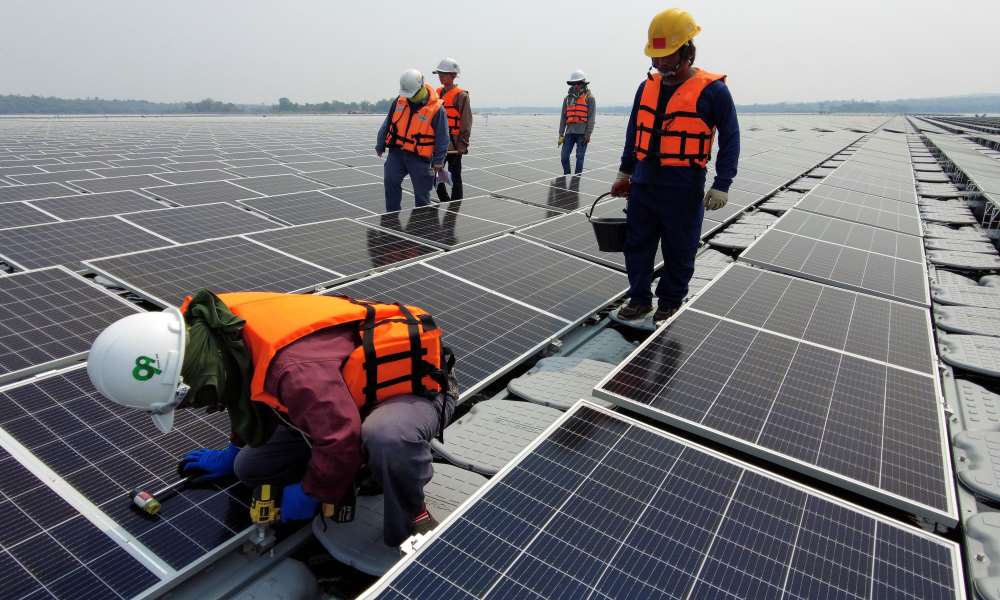Cape Town eyes cheaper feed-in meters
Cutting cost of selling power back to the grid
A cheaper specialised meter will help to back up the City's plans to support a feed-in tariff that would incentivise households and businesses to install solar PV.
Plans are afoot for the City of Cape Town to slash the cost of a specialised meter by more than half, so that customers can use it to feed power back to the municipal grid.This is according to Mayor Geordin Hill-Lewis, who on Friday was speaking at Daily Maverick's annual event, The Gathering.
The specialised meters or bi-directional meters are required to feed power back to the grid, but they are quite costly for residents, around R12 000, Hill-Lewis said.
However, the municipality is currently testing a cheaper model, which could cost less than R6 000, and there are plans to release it later this year.
"We are ordering sufficient quantity to sell it to you [residents]. Within the next six months or so, we will have a meter which is less than half that price [R12 000]," he said.
A cheaper specialised meter will help to back up the City's plans to support a feed-in tariff that would incentivise households and businesses to install solar PV (photovoltaics).
The feed-in tariff, which is approved by the National Regulator of South Africa, is at 78.89c for residents and will be raised by 10.15%. This is over and above the City's 25c/kWh incentive for customers selling power back to it.
Hill-Lewis said on Friday, that the original feed-in tariff of R1.04/kWh has been raised to R1.24/kWh this year.
The City also removed the cap on how much power customers can sell to the municipality – previously, they had to be net consumers.
Bills
"Previously, you needed to be a net consumer and have your electricity bills credited. You can now be a 'prosumer'. You can produce as much as you want and sell back as much as you want to the City. We will buy it all. If your account runs into a deficit, in other words, we owe you money, we will pay you. We will actually send you the cash for that power," he said.
These measures seem to have encouraged more households and businesses to apply to have solar PV installations registered with the City.
In the month of March, the City received close to 700 new applications for solar PV installations, a new monthly record.
According to a statement issued by the City on Monday, there have been 2 333 applications for 2023 so far, with increasing interest from residents.
The previous record was set in February when just over 600 applications were received, bringing the total applications for the first two months of the year to 1040.
Since February, the number of applications more than doubled.
"Just the first four months of 2023 account for a sizeable 21% of all solar PV applications received since records began in 2018," the City said in a statement.
The City ultimately wants to protect residents and businesses from four stages of load shedding within three years and reduce its reliance on Eskom.
Incentive
For this reason it will also launch the Power Heroes campaign later this year – incentivising households and residents to reduce electricity demand during peak times.
“Should just 25 000 of Cape Town's more than 600 000 electricity customers sign-up as Power Heroes, we can protect against an additional one full stage of load shedding during peak hours," said Hill-Lewis.
"And for every 20 000 customers we add to the programme, we will be able to expand the hours of the day so that we can protect against load shedding. The programme is entirely voluntary and costs nothing for those who sign up," he added.
The City also relies on the Steenbras hydro-pumped storage scheme to protect against two stages of load shedding. Another planned R1.2 billion solar plant outside Somerset West will shield it from one stage of load shedding.
It is also procuring 700 MW of additional power – 200 MW of renewable energy and 500 MW of technology-agnostic dispatchable energy.
Over and above the municipal interventions are national government's tax credits for South Africans looking to install solar PV.
Households can claim a tax rebate of 25% on the cost of the solar PV panels, but this is capped at R15 000. Businesses can claim a 125% tax credit on any renewable energy project.-Fin24





Comments
My Zone
No comments have been left on this article